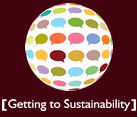By Carol A Adams, Monash University
Investors are increasingly interested in how companies manage non-financial — environmental and social — risks. And there is still substantial room for improvement. The recent Sustainability Reporting: Practices, Performance and Potential report compared the top 40 companies by size in Australia, Hong Kong and the UK, and found Australian companies disclosed most on the environment, explained by the significance of the resources sector in the sample.
British companies reported more diverse social, environmental and economic sustainability information.
Governance and environmental disclosures were highest across all three countries, explained by “an overlap with regulatory reporting requirements” and, in the case of environmental issues, a longer history of reporting. Human rights, society and product responsibility disclosures attracted the lowest disclosure scores — which the report said suggested companies faced little pressure or deemed immaterial.
The report’s finding that profitability and cash flow return are strongly correlated with sustainability disclosures should provide motivation for better disclosures. It is a finding backed by prior research.
A key driver for reporting — and increasing the quality of sustainability information — is demand from stakeholders including regulators. Companies with a high impact on the environment or indigenous people, for example, come under more pressure from stakeholders to report.
But corporate action often follows a crisis or incident, media reporting and/or NGO campaigns which can have a significantly negative impact on profitability.
Economic, environmental and sustainability risks can have a significant impact on business reputations and their financial bottom line. Ian Woods, Head of Environmental, Social and Governance (ESG) Research at AMP Capital and Deputy Chair of the Investor Group on Climate Change has spoken about how this can translate to a country level risk, for example where supply chains are interrupted.
The importance of sustainable supply chain management was underlined by the clothing factory collapse in Bangladesh. Other ESG risks — health impacts, labour right issues, pollution incidents — arise when stakeholders are not regularly consulted and their concerns not addressed.
Investors want to know that there are processes in place to identify, monitor and respond to such risks.
ASX proposes greater ESG disclosure
Following similar developments in other countries the ASX Corporate Governance Council last month put out to public consultation a Review of the Corporate Governance Principles and Recommendations. The review proposes that listed companies should be required to disclose whether they have had regard to economic, environmental and social sustainability risks, and if so, how.
The preparation of an integrated report and/or a sustainability report is a way to demonstrate that these processes are in place.
In addition to reporting a range of ESG (referred to in reporting frameworks as social, environmental and economic sustainability) issues, a sustainability report should disclose the organisation’s approach to engaging with stakeholders and determining material issues.
The Global Reporting Initiative’s G4 guidelines, released in May 2013, differentiate two levels of sustainability reporting — core and comprehensive.
The comprehensive level requires disclosure of the highest governance body’s role in the identification and management of social, environmental and economic impacts, risk and opportunities and whether stakeholder consultation is used to support it. And it also requires organisations to identify and disclose their process of stakeholder identification and consultation.
Are Australian companies prepared for sustainability reporting?
So how well are Australian listed companies prepared for the ASX proposals? How well are they managing sustainability performance and risk?
Research on reporting practices has consistently shown over an extended period that larger organisations disclose more and that industry sector has a significant impact on the extent and type of disclosures.
But research — and events — also suggest that even amongst large, high risk companies, there can be a lack of comprehensive risk identification and monitoring.
KPMG’s International Survey of Corporate Responsibility Reporting, published in 2011, analysed reports from 34 countries and 16 sectors. It assessed a number of report elements including use of the GRI reporting framework, and found a difference between sectors, with mining and forestry, pulp and paper “leading the pack”. With a relatively large proportion of its biggest companies in the high impact sectors the Australian reports were amongst the best.
But KPMG also found that only around half of the Australian sustainability reporters were getting their reports externally assured. This is concerning given that external assurance adds credibility to the reports. An external assurance process can provide useful feedback to management about their reporting, management and governance processes.
Sustainability risk is a board issue
Another key issue which the ASX proposal may go some way to addressing is the extent to which Environment, Social and Governance risks identified in the sustainability reporting process get included in the risk register.
Currently, these sustainability reports are often not signed off by corporate boards.
HSBC is one of the world’s top three largest banks. Yet several pages of discussion on strategic direction and risks up front in its annual report for 2012 lacked analysis of ESG issues.
Although more detail is provided later in the report it raises questions as to the extent to which consideration of ESG risks is integrated into strategy and risk management. (My analysis is available here.)
All of this indicates that corporate boards will need to start paying more attention to integrated reports, sustainability reports and risks.
This is the first of our series on the 2013 AGM season.
Carol Adams is a Director of Integrated Horizons providing advisory services in corporate reporting and strategy. She is a member of the Global Reporting Initiative’s Stakeholder Council.
![]()
This article was originally published at The Conversation.
Read the original article.
